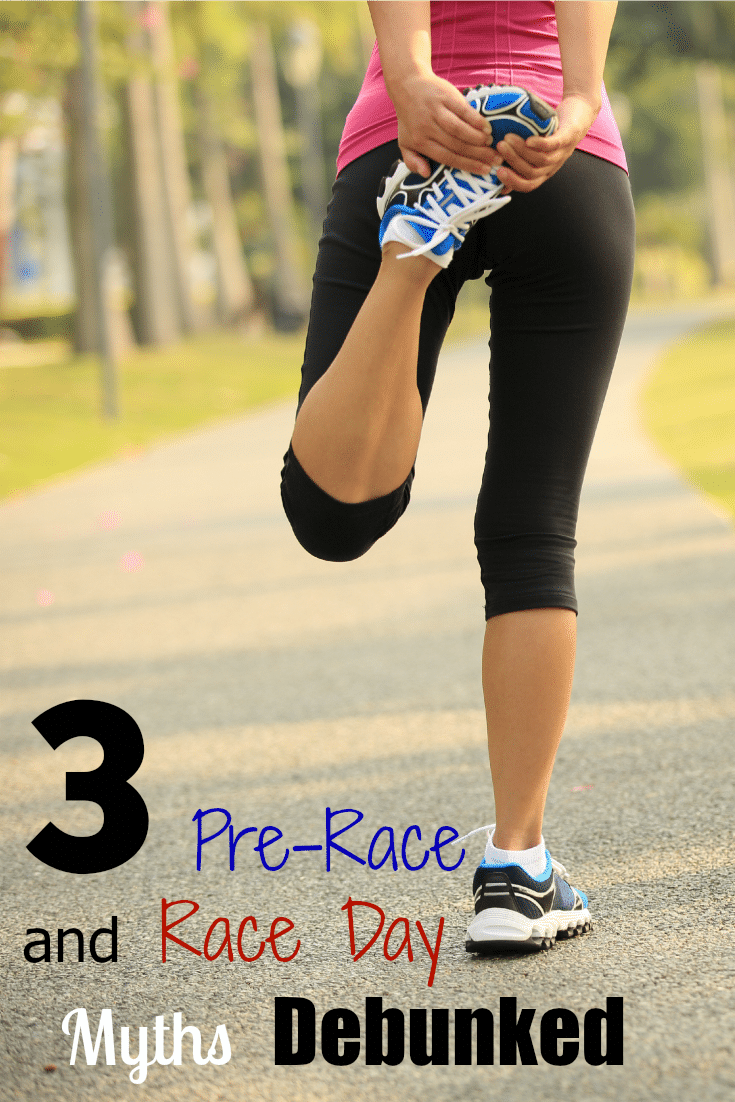 Runners put a lot of thought and planning into their training schedule, and rightfully so. The right combination of recovery, hard workouts, mileage and long runs are the main factors to running a new personal best.
Runners put a lot of thought and planning into their training schedule, and rightfully so. The right combination of recovery, hard workouts, mileage and long runs are the main factors to running a new personal best.
However, an often overlooked, yet critical component to running fast is executing in the final days and hours leading up to the race.
Unfortunately, even small mistakes in this tiny window before a race can spell disaster no matter how fit you are.
To help you get the most out of your training and to maximize your chances of success on race day, let’s look at three of the most common pre-race and race day myths. More importantly, you’ll learn why and how to avoid making these same mistakes at your next race.
Warming up will make you tired for the race itself
Many beginner runners devalue the importance of warming-up before a race. Not only will it help prevent injury by ensuring that your muscles are primed for hard running, but it will dramatically increase performance.
When I’ve polled runners about why they don’t warm-up, even when they know it’s beneficial, the number one reason is that they’re worried it will make them tired before the race.
Don’t feel ashamed if you’ve made this mistake, we all have.
I remember thinking my high school coach was crazy when he told me to jog for 15 minutes before the start of my race. “Uh coach, running makes me tired and I’ve got this big race to run you know.”
Luckily for my competitors at the time, I couldn’t have been more wrong.
Here’s the deal:
If you’ve put in the necessary training to prepare for your goal race, running 10 to 15 minutes easily before a race will absolutely not fatigue you in any way. You won’t burn significant glycogen (energy) and your muscles won’t get tired – guaranteed. It is even important to warm up for a marathon.
Warming up will slightly increase your core body temperature, which speeds oxygen throughout the body, primes the muscles for hard running, and triggers the neural pathways between your brain and your muscles to improve muscle contraction and power.
It gets better:
By warming-up before your races, you’ll toe the line ready for optimal performance, as opposed to needing the first few miles to get into a rhythm.
Taking a rest day before the race will keep your legs fresh
The day before a race is an important day and full of decisions that can affect your performance – both positively and negatively. You’ve got to fuel properly and prepare your body and mind for optimal performance the next day. It’s not surprising then that one of the most common mistakes runners make is resting the day before the race.
Like the myth of not wanting to warm-up for fear of getting tired, many runners think that running the day before a race will only make their legs tired for the next day.
Unfortunately, not only will running the day before not make you tired, but it could dramatically improve your performance.
It doesn’t matter what race distance you’re training for, a 15 to 20-minute run is going to be considered nothing more than a shakeout.
If you’re recovery runs (probably longer than 15-minutes) during the hardest portion of your training cycle have enabled you to adequately recover between hard workouts, what would change the day before your race?
Nothing changes.
The run doesn’t tire you out and only serves to prepare your legs, body, and mind to perform optimally the following day.
The benefits
Ok, so we know now that running the day before won’t make you tired, but what are the benefits?
Like the warm-up, a run the day before a race helps improve blood flow to the muscles, which allows them to loosen up and delivers the nutrients and oxygen they will need for the intense running the next day.
For longer races like the half marathon and marathon, running the day before will even help your muscles store extra glycogen.
You’ll also stimulate the central nervous system, which responds quickly to new stimuli because the growth and recovery cycle is very short.
Want to know the best part?
You can make small improvements to your neuromuscular coordination in less than a day. Conversely, degradation of the neuromuscular system can occur in a day or two, which means if you don’t run the day before the race, your neuromuscular system isn’t performing at it’s optimal level.
This is the reason runners often feel lethargic and stiff when they don’t run for a day or two.
Thinking “I’ve got the perfect race plan”
A race will never go as planned.
It doesn’t matter how well-trained you are, or how much time you spent plotting the perfect strategy, something is going to happen that you didn’t expect.
Veteran runners have enough race experience that they’ve seen just about everything and are generally more prepared for any circumstance. Unfortunately, most beginner runners can be thrown off their target much easier and thus must practice and prepare to adapt.
The best way to prepare mentally for something going wrong in a race is to use visualization techniques in the weeks and days leading up to the race.
Visualize as many different scenarios you can think of and then imagine how you’ll feel and prepare a plan of attack in your mind. By conjuring up these emotions, sights, and sounds, you can prepare yourself to remain calm, collected, and execute in a chaotic environment. If any of your scenarios happen during the race, you’ll know exactly what to do and it won’t throw you off your game.
Have you fallen victim to one of these three common myths? Don’t be embarrassed, every runner does, especially when they first start racing. Keep this article in mind in the days leading up to your big race this spring and watch as your race performance improves without changing a thing in training.






4 Responses
I have to admit…I haven’t warmed up before any of my big races, like the Ottawa Half or Army Run , in the last few years. Mainly because I feel tired most days already. In addition, I never saw a big value to running the day before a race.
Thanks for Sharing Jeff!
I would be curious to learn more about training with autoimmune diseases. I find I need more rest between runs than an average person. I really just try to listen to my body and what it can take but outlining a training schedule would be really nice.
I agree wholeheartedly with this article. Before a 5 or 10k an easy 2 mile run with a few strides thrown in shortly before the race starts works well for me. If I don’t it is a shock to the body and the race just doesn’t go as well. Imagine it’s first thing in the morning and you bolt from the starting line and your body is like, what the *#%?! Are you trying to do to me? It’s harder to breathe and just harder to run in general. I do basically the same for the half and the marathon but I might go a little shorter and a little easier on the strides. As far as I’m concerned the warm up is essential unless your fine with just jogging through the race.
I used the warming up before the race technique before a 10K recently and got a new PB. I felt good from the start from the race.
normally it take a good mile for me to get into stride,and then have to work harder the rest of the race.